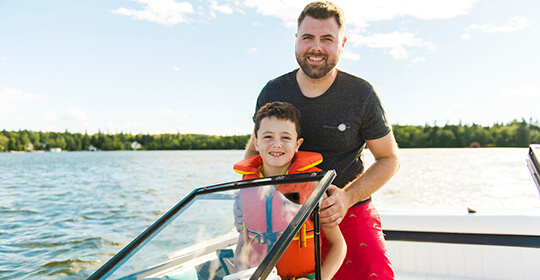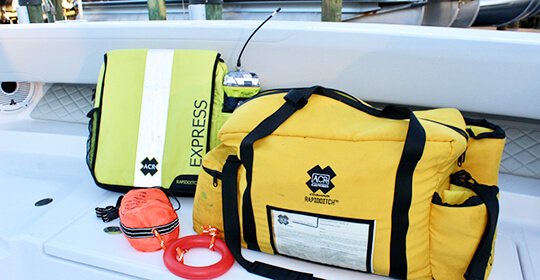Safe Boating: 10 Tips for a Stress-Free Season on the Water
By Debbie Hanson
Apr 29, 2024
List of ten safe boating tips that can contribute to a stress-free season on the water. What to know about boating safety courses, float plans, emergency equipment
With the number of new boaters taking to our waterways every year, safe boating knowledge and preparedness is more important than ever. Thankfully, there are plenty of resources that can help boaters of all experience levels become more educated, more responsible, and smarter about the time they spend behind the helm.

Since National Safe Boating Week 2024 is coming up from May 18-24, it’s a great time to brush up on boating safety tips that can contribute to a stress-free summer season. Check out ten life-saving tips from the National Safe Boating Council in honor of Safe Boating Week 2024.
1. Take a boating safety course in your local area. Every boater, from novices to longtime boaters, can benefit from updated knowledge and on-the-water experience by taking a boating safety course. Even if you’ve been boating for years, taking a boater safety course during Safe Boating Week 2024 (or anytime) to refresh your knowledge is always a smart idea.
2. Check your boating equipment. Schedule a free vessel safety check with your local U.S. Coast Guard Auxiliary or U.S. Power Squadrons to make sure all of the essential equipment is present, in working order, and in good condition.
3. File a float plan. Always communicate your trip itinerary to someone on land -- including operator and passenger information, boat type and registration, the approximate time you intend on returning, and the type of communication equipment that is on board.
4. Wear a life jacket (also referred to as a PFD or personal flotation device) and make sure everyone on board wears a life jacket. In addition, part of life jacket safety is making sure that every life jacket you purchase is U.S. Coast Guard approved, appropriate for the type of boating or water activity, and fits properly.
5. Use an engine cut-off switch – it’s the law. An engine cut-off switch is a proven safety device to stop a powerboat engine if the operator unexpectedly goes overboard.

6. Keep an eye on the weather. Always check the marine weather forecast before departing on the water and frequently during the excursion.
7. Be aware of what’s going on around you at all times. According to the National Safe Boating Council, nearly a quarter of all reported boating incidents in 2022 were caused by operator inattention or improper lookout.
8. Travel at safe speeds and learn the area. Get familiar with the area, abide by all local boating speed zones, and always travel at a safe speed.
9. Never boat under the influence. A BUI is involved in one-third of all recreational boating fatalities. Always designate a sober skipper.
10. Have more than one communication device that will work when wet. Waterproof VHF radios, emergency locator beacons, satellite phones, and cell phones can all be important devices in an emergency.
For more helpful information on boating safety, you can contact the U.S. Coast Guard Auxiliary in your area or do an online search for the “National Safe Boating Council.”









